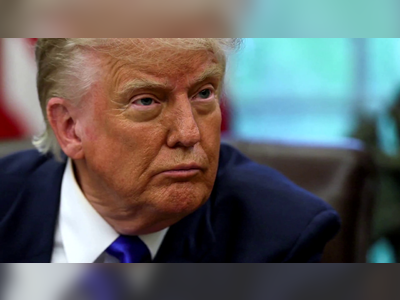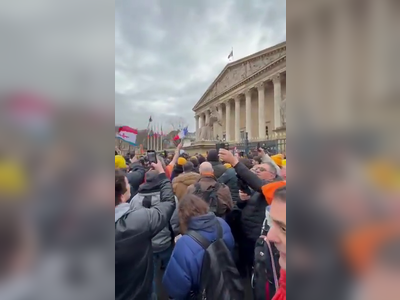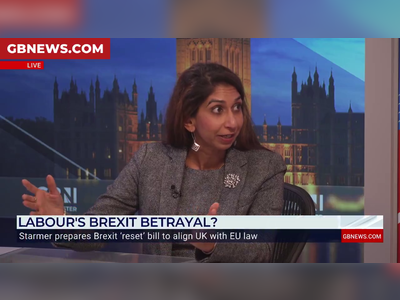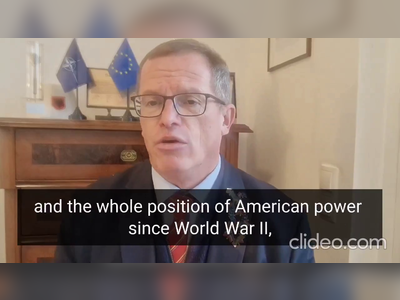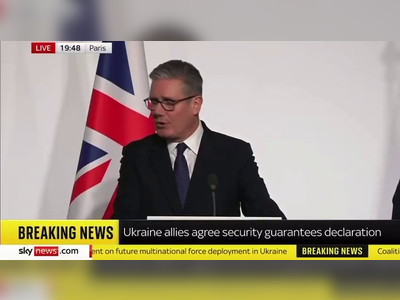US Representatives Now Echoing Russian Propaganda
As US President Joe Biden proposed an additional $24 billion in supplemental funding for Ukraine in August, Moscow's Kremlin-employed spin doctors were ready to attempt to undermine the bill's public support, internal documents reveal.
In a sustained campaign aimed at influencing Congressional and political debates to fuel anti-Ukraine sentiment, Kremlin-linked political strategists and trolls penned thousands of counterfeit news articles, social media posts, and comments. These aimed to promote American isolationism, instill fear over immigration, and amplify economic and racial tensions in the US, according to internal Kremlin documents obtained by a European intelligence service and published by The Washington Post.
One case saw a political strategist instruct a troll farm employee to compose a comment under a pseudonym of a resident of a major US city. This fictional American was portrayed as opposing US military aid to Ukraine, believing the funds should instead protect America's borders, not Ukraine's. They saw Biden's policy as leading the US to collapse.
The over 100 documents, created between May 2022 and August 2023, were provided to The Washington Post to expose the Kremlin's propaganda operations aimed at undermining support for Ukraine in the United States. This leak is part of a series offering a rare glimpse into Moscow's efforts to weaken support for Ukraine not only in the US but also in France, Germany, and destabilize Ukraine itself.
The Battle of Communication
As Russia intensifies its propaganda operations, seen by current and former senior Western officials as almost as crucial as its military campaign in Ukraine, particularly as Congressional approval for further aid becomes critical for Kyiv’s defense capabilities.
>A source within the Capitol, requesting anonymity, revealed that for Russia, stopping arms shipments is a top priority, thus they are throwing various strategies at the wall to see what sticks. They flood the discourse with all sorts of misinformation, undeterred by the efficacy of individual tactics.
The campaign attempted to paint Ukrainian President Volodymyr Zelensky as corrupt, exaggerated the number of immigrants crossing the US-Mexico border, demanded funding for border security over aid to Ukraine, and labelled "white Americans" as the primary losers of foreign aid.
The strategy favors the viewpoints of the far-right wing of the Republican Party, intending for these messages to be echoed by influential American public figures and politicians, though without specifying whom.
The documents contain metadata traceable to the team of Ilja Gambasidze, leader of Moscow's Social Design Agency. The US imposed sanctions on him last month for participating in "a sustained foreign malign influence campaign," at the Kremlin's behest, which aimed at creating websites to impersonate European media outlets - a campaign West officials called "Doppelganger".
Neither Gambasidze nor Dmitry Peskov, the Kremlin spokesperson, responded to requests for comments.
Kremlin's Web of Propaganda
This campaign is part of a sophisticated strategy based on nearly a decade-long effort by the Kremlin to amplify voices of populist, anti-establishment politicians opposing the US's global role, say analysts and former American officials.
Since August, the far-right wing of the Republican Party has effectively blocked further aid to Ukraine. The Kremlin's efforts to erode support for Ukraine in the US may have found more fertile ground than anywhere else.
>Clint Watts, a leading analyst at Microsoft Center for analyzing online threats, commented on the visibility of the Russian program’s impact on Congressional debates over support for Ukraine. The campaigns strategically exerted a cumulative effect, rendering previously unheard arguments, like downplaying the importance of Ukraine or withhold NATO support, surprisingly effective on digital platforms.
Michael R. Turner, an Ohio State Republican Representative and chair of the House Permanent Select Committee on Intelligence, echoed these concerns on CNN's "State of the Union", acknowledging the repetition of Russian propaganda regarding the war in Ukraine by some Congress members.
Watts further explained that Russia's strategy involves echoing what people have already heard, adding a sprinkle of what they want to hear, which becomes highly effective when repeated.
The Kremlin's interference in American politics became evident around the 2016 presidential election, with the utilization of a vast troll network to disseminate disinformation supporting Donald Trump's campaign and sabotaging Hillary Clinton. Despite heightened monitoring on social media platforms, disinformation campaigns persist widely.
Technical Tricks of Disinformation
Gambasidze’s team's tactics included the creation of "short-lived" social media accounts for obscure operation, facilitating the deletion of posts or accounts once content was redistributed to obscure the misinformation's origins. Techniques like posting only URLs in posts to hinder searches and redirecting users across multiple seemingly random sites before reaching misleading articles have been deployed for obfuscation, coined as "writing with invisible ink" by social media research company Alethea.
One document reviewed by The Washington Post described using the Truth Social platform for "uncensored" post distribution and establishing "short-lived" accounts on Facebook, Twitter, and YouTube, delineating an intricate web of deceit in the digital age.
One case saw a political strategist instruct a troll farm employee to compose a comment under a pseudonym of a resident of a major US city. This fictional American was portrayed as opposing US military aid to Ukraine, believing the funds should instead protect America's borders, not Ukraine's. They saw Biden's policy as leading the US to collapse.
The over 100 documents, created between May 2022 and August 2023, were provided to The Washington Post to expose the Kremlin's propaganda operations aimed at undermining support for Ukraine in the United States. This leak is part of a series offering a rare glimpse into Moscow's efforts to weaken support for Ukraine not only in the US but also in France, Germany, and destabilize Ukraine itself.
The Battle of Communication
As Russia intensifies its propaganda operations, seen by current and former senior Western officials as almost as crucial as its military campaign in Ukraine, particularly as Congressional approval for further aid becomes critical for Kyiv’s defense capabilities.
>A source within the Capitol, requesting anonymity, revealed that for Russia, stopping arms shipments is a top priority, thus they are throwing various strategies at the wall to see what sticks. They flood the discourse with all sorts of misinformation, undeterred by the efficacy of individual tactics.
The campaign attempted to paint Ukrainian President Volodymyr Zelensky as corrupt, exaggerated the number of immigrants crossing the US-Mexico border, demanded funding for border security over aid to Ukraine, and labelled "white Americans" as the primary losers of foreign aid.
The strategy favors the viewpoints of the far-right wing of the Republican Party, intending for these messages to be echoed by influential American public figures and politicians, though without specifying whom.
The documents contain metadata traceable to the team of Ilja Gambasidze, leader of Moscow's Social Design Agency. The US imposed sanctions on him last month for participating in "a sustained foreign malign influence campaign," at the Kremlin's behest, which aimed at creating websites to impersonate European media outlets - a campaign West officials called "Doppelganger".
Neither Gambasidze nor Dmitry Peskov, the Kremlin spokesperson, responded to requests for comments.
Kremlin's Web of Propaganda
This campaign is part of a sophisticated strategy based on nearly a decade-long effort by the Kremlin to amplify voices of populist, anti-establishment politicians opposing the US's global role, say analysts and former American officials.
Since August, the far-right wing of the Republican Party has effectively blocked further aid to Ukraine. The Kremlin's efforts to erode support for Ukraine in the US may have found more fertile ground than anywhere else.
>Clint Watts, a leading analyst at Microsoft Center for analyzing online threats, commented on the visibility of the Russian program’s impact on Congressional debates over support for Ukraine. The campaigns strategically exerted a cumulative effect, rendering previously unheard arguments, like downplaying the importance of Ukraine or withhold NATO support, surprisingly effective on digital platforms.
Michael R. Turner, an Ohio State Republican Representative and chair of the House Permanent Select Committee on Intelligence, echoed these concerns on CNN's "State of the Union", acknowledging the repetition of Russian propaganda regarding the war in Ukraine by some Congress members.
Watts further explained that Russia's strategy involves echoing what people have already heard, adding a sprinkle of what they want to hear, which becomes highly effective when repeated.
The Kremlin's interference in American politics became evident around the 2016 presidential election, with the utilization of a vast troll network to disseminate disinformation supporting Donald Trump's campaign and sabotaging Hillary Clinton. Despite heightened monitoring on social media platforms, disinformation campaigns persist widely.
Technical Tricks of Disinformation
Gambasidze’s team's tactics included the creation of "short-lived" social media accounts for obscure operation, facilitating the deletion of posts or accounts once content was redistributed to obscure the misinformation's origins. Techniques like posting only URLs in posts to hinder searches and redirecting users across multiple seemingly random sites before reaching misleading articles have been deployed for obfuscation, coined as "writing with invisible ink" by social media research company Alethea.
One document reviewed by The Washington Post described using the Truth Social platform for "uncensored" post distribution and establishing "short-lived" accounts on Facebook, Twitter, and YouTube, delineating an intricate web of deceit in the digital age.
Translation:
Translated by AI
AI Disclaimer: An advanced artificial intelligence (AI) system generated the content of this page on its own. This innovative technology conducts extensive research from a variety of reliable sources, performs rigorous fact-checking and verification, cleans up and balances biased or manipulated content, and presents a minimal factual summary that is just enough yet essential for you to function as an informed and educated citizen. Please keep in mind, however, that this system is an evolving technology, and as a result, the article may contain accidental inaccuracies or errors. We urge you to help us improve our site by reporting any inaccuracies you find using the "Contact Us" link at the bottom of this page. Your helpful feedback helps us improve our system and deliver more precise content. When you find an article of interest here, please look for the full and extensive coverage of this topic in traditional news sources, as they are written by professional journalists that we try to support, not replace. We appreciate your understanding and assistance.







